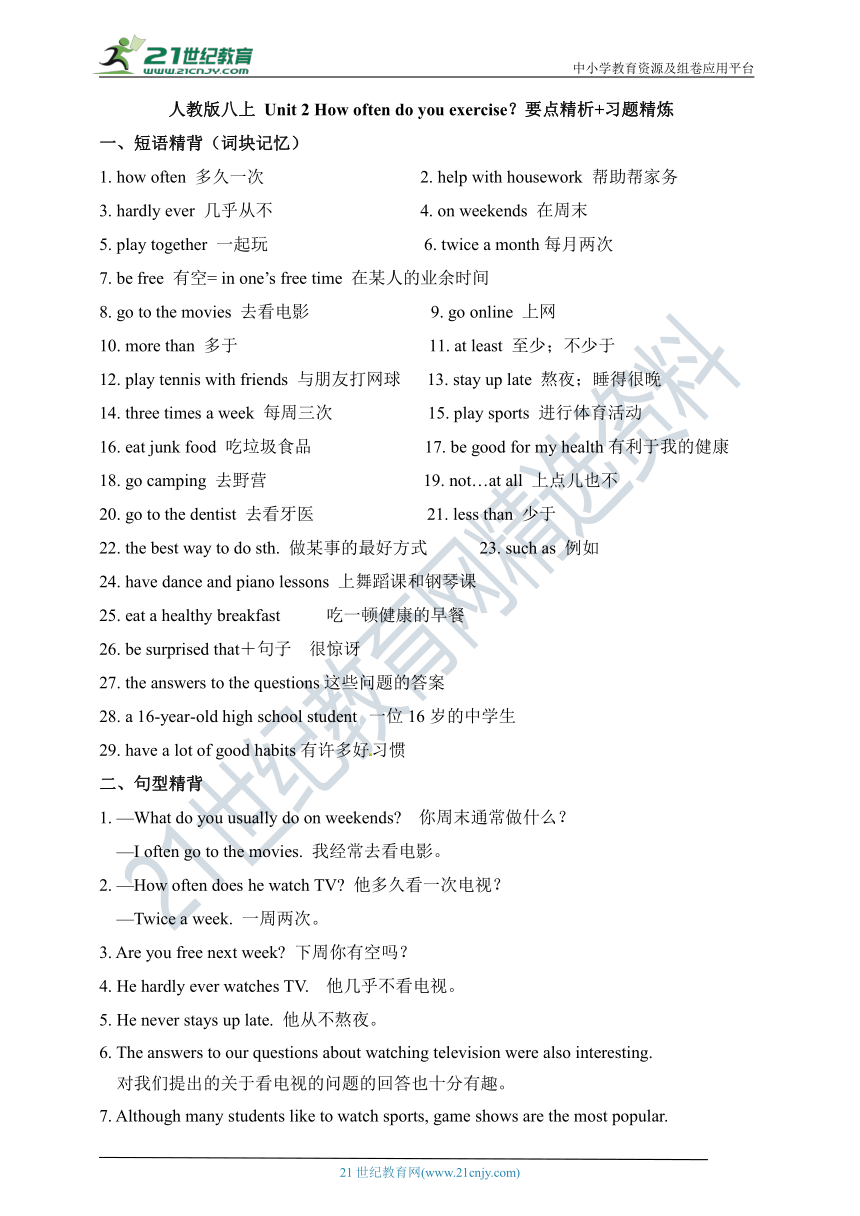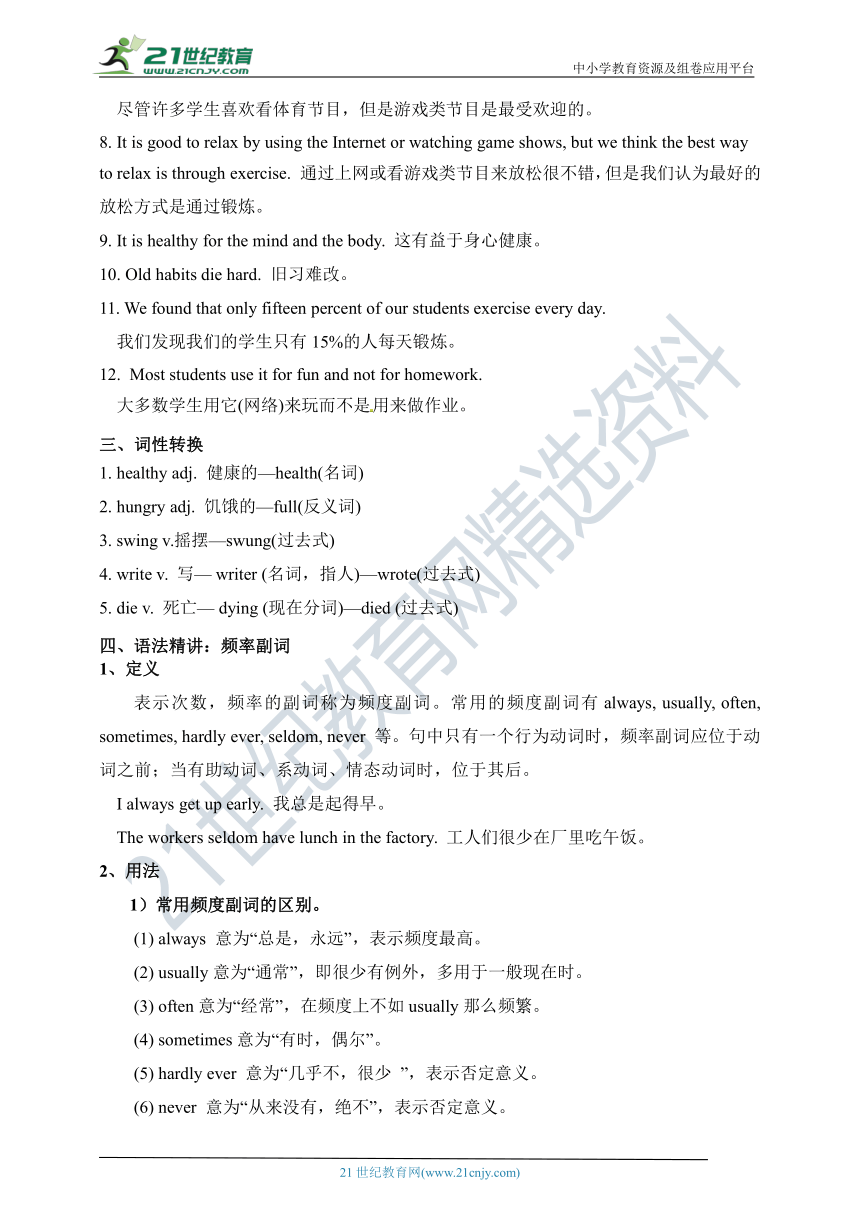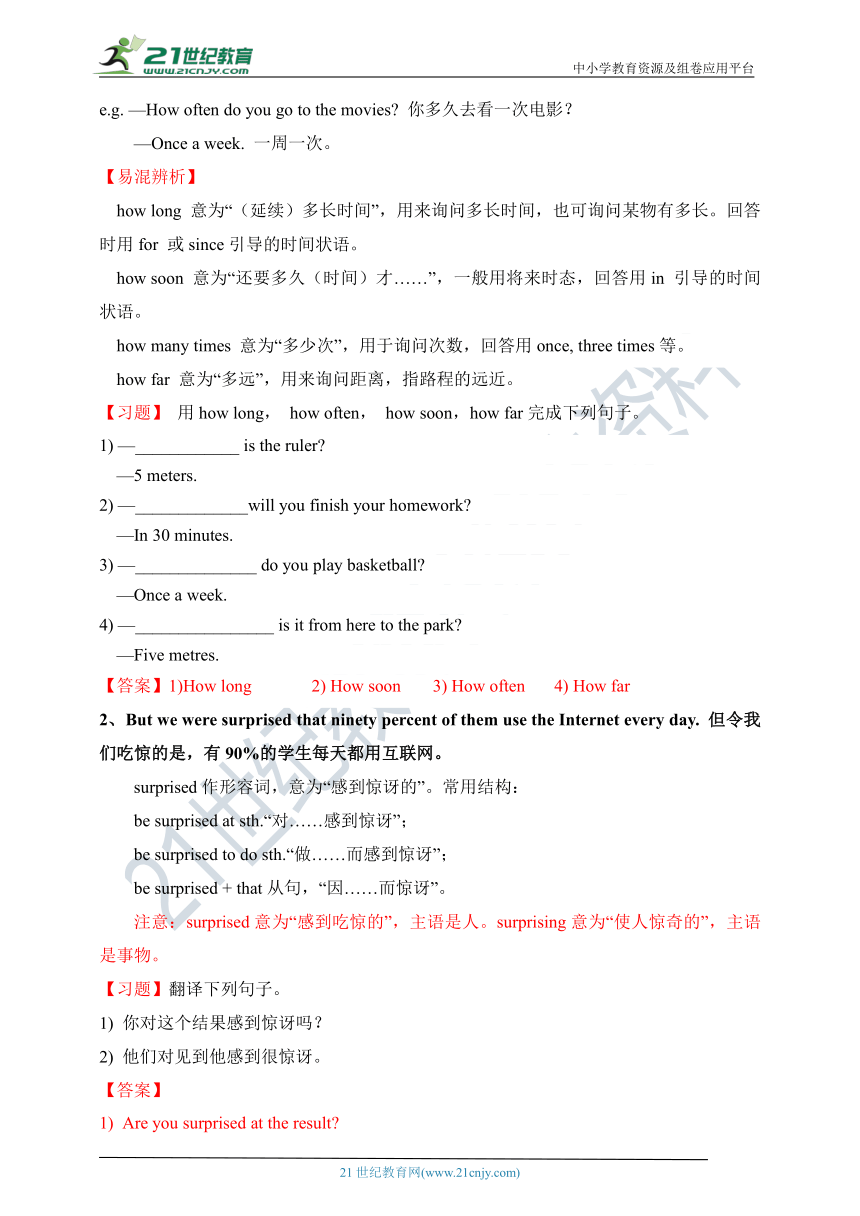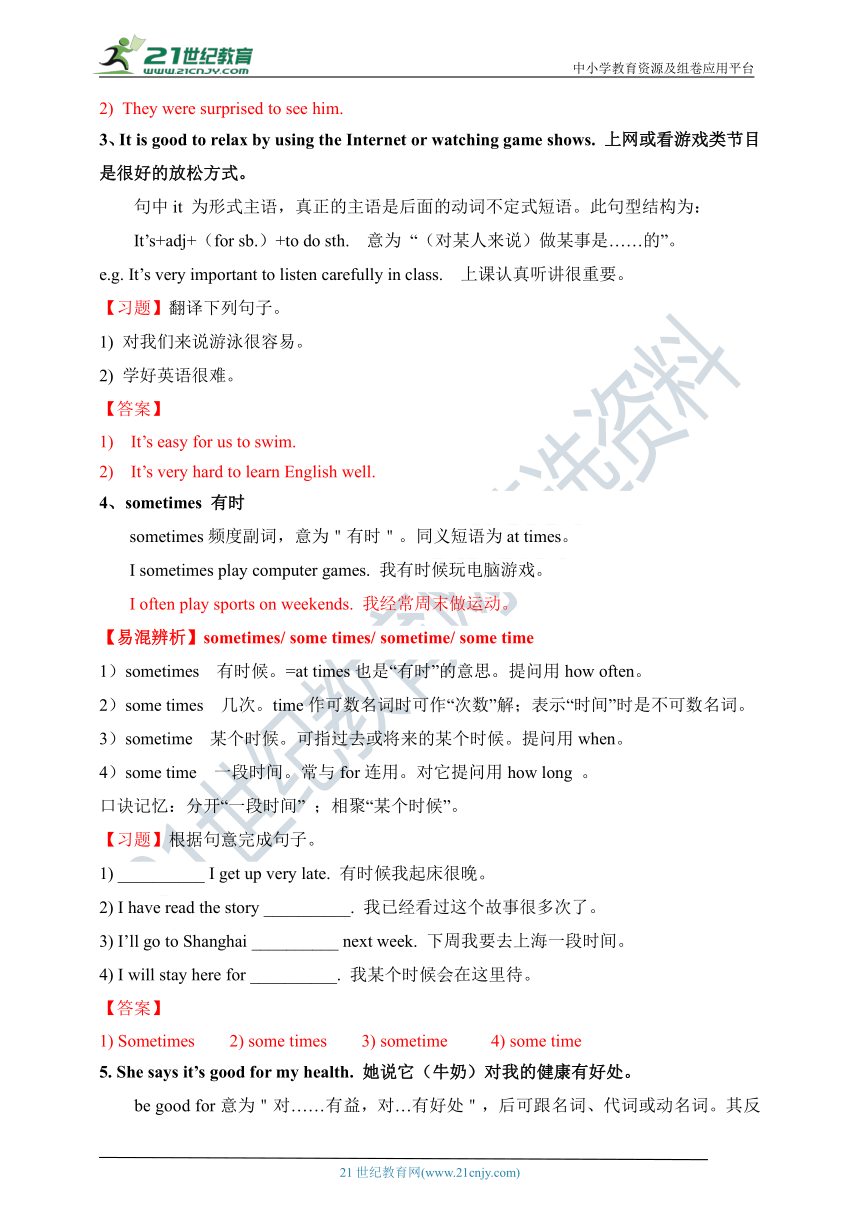Unit 2 How often do you exercise单元要点精析+习题精炼(有答案)
文档属性
| 名称 | Unit 2 How often do you exercise单元要点精析+习题精炼(有答案) |

|
|
| 格式 | zip | ||
| 文件大小 | 1.2MB | ||
| 资源类型 | 试卷 | ||
| 版本资源 | 人教新目标(Go for it)版 | ||
| 科目 | 英语 | ||
| 更新时间 | 2020-09-18 00:00:00 | ||
图片预览





文档简介
中小学教育资源及组卷应用平台
人教版八上
Unit
2
How
often
do
you
exercise?要点精析+习题精炼
一、短语精背(词块记忆)
1.
how
often
多久一次
2.
help
with
housework
帮助帮家务
3.
hardly
ever
几乎从不
4.
on
weekends
在周末
5.
play
together
一起玩
6.
twice
a
month每月两次
7.
be
free
有空=
in
one’s
free
time
在某人的业余时间
8.
go
to
the
movies
去看电影
9.
go
online
上网
10.
more
than
多于
11.
at
least
至少;不少于
12.
play
tennis
with
friends
与朋友打网球
13.
stay
up
late
熬夜;睡得很晚
14.
three
times
a
week
每周三次
15.
play
sports
进行体育活动
16.
eat
junk
food
吃垃圾食品
17.
be
good
for
my
health有利于我的健康
18.
go
camping
去野营
19.
not…at
all
上点儿也不
20.
go
to
the
dentist
去看牙医
21.
less
than
少于
22.
the
best
way
to
do
sth.
做某事的最好方式
23.
such
as
例如
24.
have
dance
and
piano
lessons
上舞蹈课和钢琴课
25.
eat
a
healthy
breakfast[来K]吃一顿健康的早餐
26.
be
surprised
that+句子 很惊讶
27.
the
answers
to
the
questions这些问题的答案
28.
a
16?year?old
high
school
student[]一位16岁的中学生
29.
have
a
lot
of
good
habits有许多好习惯[来
二、句型精背
1.
?—What
do
you
usually
do
on
weekends?
你周末通常做什么?
—I
often
go
to
the
movies.
我经常去看电影。
2.
—How
often
does
he
watch
TV?
他多久看一次电视?
—Twice
a
week.
一周两次。
3.
Are
you
free
next
week?
下周你有空吗?
4.
He
hardly
ever
watches
TV.
他几乎不看电视。
5.
He
never
stays
up
late.
他从不熬夜。
6.
The
answers
to
our
questions
about
watching
television
were
also
interesting.
对我们提出的关于看电视的问题的回答也十分有趣。
7.
Although
many
students
like
to
watch
sports,
game
shows
are
the
most
popular.
尽管许多学生喜欢看体育节目,但是游戏类节目是最受欢迎的。
8.
It
is
good
to
relax
by
using
the
Internet
or
watching
game
shows,
but
we
think
the
best
way
to
relax
is
through
exercise.
通过上网或看游戏类节目来放松很不错,但是我们认为最好的放松方式是通过锻炼。
9.
It
is
healthy
for
the
mind
and
the
body.
这有益于身心健康。
10.
Old
habits
die
hard.
旧习难改。
11.
We
found
that
only
fifteen
percent
of
our
students
exercise
every
day.[][
我们发现我们的学生只有15%的人每天锻炼。[]
Most
students
use
it
for
fun
and
not
for
homework.
大多数学生用它(网络)来玩而不是用来做作业。
三、词性转换
1.
healthy
adj.
健康的—health(名词)
2.
hungry
adj.
饥饿的—full(反义词)
3.
swing
v.摇摆—swung(过去式)
4.
write
v.
写—
writer
(名词,指人)—wrote(过去式)
5.
die
v.
死亡—
dying
(现在分词)—died
(过去式)
四、语法精讲:频率副词
1、定义
表示次数,频率的副词称为频度副词。常用的频度副词有always,
usually,
often,
sometimes,
hardly
ever,
seldom,
never
等。句中只有一个行为动词时,频率副词应位于动词之前;当有助动词、系动词、情态动词时,位于其后。
I
always
get
up
early.
我总是起得早。
The
workers
seldom
have
lunch
in
the
factory.
工人们很少在厂里吃午饭。
2、用法
1)常用频度副词的区别。
(1)
always
意为“总是,永远”,表示频度最高。
(2)
usually意为“通常”,即很少有例外,多用于一般现在时。
(3)
often意为“经常”,在频度上不如usually那么频繁。
(4)
sometimes意为“有时,偶尔”。
(5)
hardly
ever
意为“几乎不,很少
”,表示否定意义。
(6)
never
意为“从来没有,绝不”,表示否定意义。
以上几个频度副词所表示的频度,从高到低为:
Always(100%)→usually
→often
→sometimes
→hardly
ever
→never(0%)
2)提问频率用how
often,
意为“多久一次”。
E.g.
—How
often
do
you
cook?
你多久做一次饭?
—Three
times
a
week.
一周三次。
3、频率副词的特殊用法
always表示动作重复,表示频率最大,意思是"总是,一直,永远"。其反义词为never。always与进行时态连用,并不强调动作正在进行,而是表示说话人的"赞叹、不满、厌烦"等情绪,带有强烈的感彩,结构:be
always
doing
sth。
She
is
always
copying
the
homework.
她老是抄作业。(表示不满)
You
are
always
helping
others.
你总是帮助他人。(表示赞扬)
4、
翻译句子
1)你多久打扫一次你的卧室?(how
often)
_________________________________________________________________________
2)夏天的下午我们通常在公园里玩。(usually)
_________________________________________________________________________
3)
我妈妈上班从不迟到。(never)
_________________________________________________________________________
4)你应该经常去看你的祖父母。(often)
_________________________________________________________________________
5)不要总是待在家看电视。(always)
_________________________________________________________________________
【答案】
1)
How
often
do
you
clean
your
bedroom?
2)We
usually
play
in
the
park
in
the
afternoon
in
summer.
3)My
mother
is
never
late
for
work.
4)You
should
often
go
to
see
your
grandparents.
5)Don’t
always
watch
TV
at
home.
五、知识点精讲
1.
How
often
do
you
watch
TV?
你多久看
一次电视?
how
often
意为“多久一次”,用于对动作发生的频率进行提问。回答应该是频度副词或表示频率的词组,如always,usually,often,once
a
week,three
times
a
day等。
e.g.
—How
often
do
you
go
to
the
movies?
你多久去看一次电影?
—Once
a
week.
一周一次。
【易混辨析】
?how
long
意为“(延续)多长时间”,用来询问多长时间,也可询问某物有多长。回答时用for
或since引导的时间状语。
?how
soon
意为“还要多久(时间)才……”,一般用将来时态,回答用in
引导的时间状语。
?how
many
times
意为“多少次”,用于询问次数,回答用once,
three
times等。
how
far
意为“多远”,用来询问距离,指路程的远近。
【习题】
用how
long,
how
often,
how
soon,how
far完成下列句子。
1)
—____________
is
the
ruler?
—5
meters.
2)
—_____________will
you
finish
your
homework?
—In
30
minutes.
3)
—______________
do
you
play
basketball?
—Once
a
week.
4)
—________________
is
it
from
here
to
the
park?
—Five
metres.
【答案】1)How
long
2)
How
soon
3)
How
often
4)
How
far
2、But
we
were
surprised
that
ninety
percent
of
them
use
the
Internet
every
day.
但令我们吃惊的是,有90%的学生每天都用互联网。
surprised作形容词,意为“感到惊讶的”。常用结构:
be
surprised
at
sth.“对……感到惊讶”;
be
surprised
to
do
sth.“做……而感到惊讶”;
be
surprised
+
that从句,“因……而惊讶”。
注意:surprised意为“感到吃惊的”,主语是人。surprising意为“使人惊奇的”,主语是事物。
【习题】翻译下列句子。
1)
你对这个结果感到惊讶吗?
2)
他们对见到他感到很惊讶。
【答案】
Are
you
surprised
at
the
result?
They
were
surprised
to
see
him.
3、It
is
good
to
relax
by
using
the
Internet
or
watching
game
shows.
上网或看游戏类节目是很好的放松方式。
句中it
为形式主语,真正的主语是后面的动词不定式短语。此句型结构为:
It’s+adj+(for
sb.)+to
do
sth.
意为
“(对某人来说)做某事是……的”。
e.g.
It’s
very
important
to
listen
carefully
in
class.
上课认真听讲很重要。
【习题】翻译下列句子。
1)
对我们来说游泳很容易。
2)
学好英语很难。
【答案】
1)
It’s
easy
for
us
to
swim.
2)
It’s
very
hard
to
learn
English
well.
4、sometimes
有时
sometimes频度副词,意为"有时"。同义短语为at
times。
I
sometimes
play
computer
games.
我有时候玩电脑游戏。
I
often
play
sports
on
weekends.
我经常周末做运动。
【易混辨析】sometimes/
some
times/
sometime/
some
time
1)sometimes
有时候。=at
times也是“有时”的意思。提问用how
often。
2)some
times
几次。time作可数名词时可作“次数”解;表示“时间”时是不可数名词。
3)sometime
某个时候。可指过去或将来的某个时候。提问用when。
4)some
time
一段时间。常与for连用。对它提问用how
long
。
口诀记忆:分开“一段时间”
;相聚“某个时候”。
【习题】根据句意完成句子。
1)
__________
I
get
up
very
late.
有时候我起床很晚。
2)
I
have
read
the
story
__________.
我已经看过这个故事很多次了。
3)
I’ll
go
to
Shanghai
__________
next
week.
下周我要去上海一段时间。
4)
I
will
stay
here
for
__________.
我某个时候会在这里待。
【答案】
1)
Sometimes
2)
some
times
3)
sometime
4)
some
time
5.
She
says
it’s
good
for
my
health.
她说它(牛奶)对我的健康有好处。
be
good
for意为"对……有益,对…有好处",后可跟名词、代词或动名词。其反义短语be
bad
for,意为"对……有害"。
e.g.
Smoking
is
bad
for
your
health.
吸烟有害健康。
Eating
vegetables
is
good
for
your
health.
吃蔬菜对你的健康有益。
【易混辨析】
be
good
for,be
good
at与be
good
to
1)be
good
to
对…好
My
sister
is
good
to
me.我姐姐对我好。
2)be
good
for
对…有好处
Drinking
milk
is
good
for
your
health.
3)be
good
at
擅长…
He
is
good
at
telling
stories.
他擅长讲故事。
4)be
good
with
与…相处得好
He
is
good
with
the
old.
他和老人相处得好。
【习题】根据中文意思填空。
My
brother
is
Jim,
he
is
good
_______
me.
He
is
good
_______
learning
maths
and
he
is
good
_______
his
classmates.
He
takes
exercise
every
day
because
it
is
good
_______
his
health.
我哥哥是Jim,
他对我好。他擅长学习数学,他和他们班同学相处得好。他每天都做运动因为那对他的健康有好处。
【答案】1)to
2)at
3)with
4)
for
6.
Although
many
students
like
to
watch
sports,
game
shows
are
the
most
popular.虽然许多学生喜欢观看体育节目,但游戏类节目确是最受欢迎的。
Although连词,“虽然,尽管”,语气较强,可置于句首或句中,可与though互换。Although不可以与but连用,即用了although/though就不可以同时用but,不过可以与yet/still连用。
Although
he
was
tired,
he
went
on
working.
=
He
went
on
working
although
he
was
tired.
尽管累,但他坚持工作。
Although
it
rained,the
boys
still
played
outside.=
It
rained,but
the
boys
still
played
outside.
尽管天下雨了,但男孩们仍在外面玩耍。
【习题】
1.
My
cousin
knows
a
lot
about
geography,
he
is
only
four
years
old.
A.
because
B.
so
C.
although
2)
______
Lin
Feng
has
to
work
late,
she
always
wears
a
smile
on
her
face.
A.
Because
B.
If
C.
Until
D.
Though
【答案】1)C
2)D
五、习题精练
1)根据语境用括号内所给单词的适当形式填空。
1.
There
is
a
tall
building
in
the
street,
I
go
there
(two)a
month.
2.
Mr
Green
exercises
at
(little)
three
times
a
week.
3.
I
go
to
the
movies
_____________
(first)
a
month.
4.
He’s
too
young.
He
can
________________(hard)
ride
a
bike.
5.
Our
English
teacher
likes
to
wear
________?(color)
clothes,
because
she
wants
to
be
young
.
2)根据对话内容从方框中选择能填入空白处的最佳选项补全对话,其中有两项多余。
A.
I
think
I'm
kind
of
unhealthy.
B:
Oh?
Why
is
that?
1
A:I
eat
meat
three
times
a
week,
but
I
never
eat
vegetables.
B:
Oh,
I
see.
2
A:
Coffee.
I
have
to
study
late
at
night.
Coffee
makes
me
excited.
B:
3
It's
good
for
your
health.
A:Yes
I
know
that,
but
I
don't
like
milk.
B:
How
many
hours
do
you
sleep
every
night?
A:
4
B:
That's
OK.
And
how
often
do
you
exercise?
A:
5
I
feel
tired
all
day.
B:
Well.You
need
to
have
more
healthy
food
and
do
some
exercise.
It's
good
for
your
health
A.
And
what
do
you
drink?
B.
I
sleep
for
eight
hours.
C.
What
are
your
eating
habits?
D.
What
kind
of
fruit
do
you
like?
E.
Why
don't
you
drink
milk?
F.
How
often
do
you
drink
milk?
G.
I
hardly
ever
exercise.
3)
根据汉语意思翻译句子。
1.我不能再吃了,我相当饱了。
2.有时候我骑自行车去上学。
3.我上学从不迟到。
4.对我们而言努力学习很重要。
5.不要熬夜。这对你的健康不好。
4)完形填空
1
is
a
result
of
the
student
activity
survey
at
our
school.
Most
students
exercise
three
or
four
times
2
week.
Some
students
exercise
once
3
twice
a
week.
Some
students
exercise
every
day.
4
homework
,most
students
5
homework
every
day.
Some
students
do
homework
three
or
four
times
a
week
.
6
students
do
homework
once
or
twice
a
week.
The
result
for
watch
TV
is
7
.
Some
students
watch
TV
once
or
twice
a
week.
Some
watch
TV
three
or
four
8
a
week.
But
most
students
watch
TV
every
day.
9
think
it’s
helpful
for
them
10
TV.
They
can
be
relaxed
and
learn
much
knowledge(知识)by
watching
TV.
A.Here
B.There
C.Here’s
D.There’s
A.a
B.an
C.the
D./
A.and
B.but
C.or
D.so
A.With
B.By
C.To
D.As
for
A.did
B.do
C.does
D.doing
A.Not
B.No
C.Not
of
D.No
one
A.interesting
B.interests
C.interested
D.interest
A.time
B.times
C.a
time
D.some
time
A.They
B.Their
C.Them
D.Theirs
A.watch
B.To
watch
C.watches
D.watching
人教版八上Unit
2
How
often
do
you
exercise?要点精析+习题精炼
答案
1)根据语境用括号内所给单词的适当形式填空。
1.
twice
2.
least
3.
once
4.
hardly
5.
colorful
2)根据对话内容从方框中选择能填入空白处的最佳选项补全对话,其中有两项多余。
1-5
CAEBG
3)
根据汉语意思翻译句子。
1.
I
can't
eat
any
more.
I
am
quite
full
.
2.
I
sometimes
go
to
school
by
bike.
3.
I
am
never
late
for
school.
4.
It's
very
important
for
us
to
study
hard.
5.
Don't
stay
up
late
.
It’s
not
good
for
your
health.
4)完形填空
1.
A
2.
A
3.
C
4.
D
5.
B
6.
B
7.
A
8.
B
9.
A
10.
B
21世纪教育网
www.21cnjy.com
精品试卷·第
2
页
(共
2
页)
HYPERLINK
"http://21世纪教育网(www.21cnjy.com)
"
21世纪教育网(www.21cnjy.com)
人教版八上
Unit
2
How
often
do
you
exercise?要点精析+习题精炼
一、短语精背(词块记忆)
1.
how
often
多久一次
2.
help
with
housework
帮助帮家务
3.
hardly
ever
几乎从不
4.
on
weekends
在周末
5.
play
together
一起玩
6.
twice
a
month每月两次
7.
be
free
有空=
in
one’s
free
time
在某人的业余时间
8.
go
to
the
movies
去看电影
9.
go
online
上网
10.
more
than
多于
11.
at
least
至少;不少于
12.
play
tennis
with
friends
与朋友打网球
13.
stay
up
late
熬夜;睡得很晚
14.
three
times
a
week
每周三次
15.
play
sports
进行体育活动
16.
eat
junk
food
吃垃圾食品
17.
be
good
for
my
health有利于我的健康
18.
go
camping
去野营
19.
not…at
all
上点儿也不
20.
go
to
the
dentist
去看牙医
21.
less
than
少于
22.
the
best
way
to
do
sth.
做某事的最好方式
23.
such
as
例如
24.
have
dance
and
piano
lessons
上舞蹈课和钢琴课
25.
eat
a
healthy
breakfast[来K]吃一顿健康的早餐
26.
be
surprised
that+句子 很惊讶
27.
the
answers
to
the
questions这些问题的答案
28.
a
16?year?old
high
school
student[]一位16岁的中学生
29.
have
a
lot
of
good
habits有许多好习惯[来
二、句型精背
1.
?—What
do
you
usually
do
on
weekends?
你周末通常做什么?
—I
often
go
to
the
movies.
我经常去看电影。
2.
—How
often
does
he
watch
TV?
他多久看一次电视?
—Twice
a
week.
一周两次。
3.
Are
you
free
next
week?
下周你有空吗?
4.
He
hardly
ever
watches
TV.
他几乎不看电视。
5.
He
never
stays
up
late.
他从不熬夜。
6.
The
answers
to
our
questions
about
watching
television
were
also
interesting.
对我们提出的关于看电视的问题的回答也十分有趣。
7.
Although
many
students
like
to
watch
sports,
game
shows
are
the
most
popular.
尽管许多学生喜欢看体育节目,但是游戏类节目是最受欢迎的。
8.
It
is
good
to
relax
by
using
the
Internet
or
watching
game
shows,
but
we
think
the
best
way
to
relax
is
through
exercise.
通过上网或看游戏类节目来放松很不错,但是我们认为最好的放松方式是通过锻炼。
9.
It
is
healthy
for
the
mind
and
the
body.
这有益于身心健康。
10.
Old
habits
die
hard.
旧习难改。
11.
We
found
that
only
fifteen
percent
of
our
students
exercise
every
day.[][
我们发现我们的学生只有15%的人每天锻炼。[]
Most
students
use
it
for
fun
and
not
for
homework.
大多数学生用它(网络)来玩而不是用来做作业。
三、词性转换
1.
healthy
adj.
健康的—health(名词)
2.
hungry
adj.
饥饿的—full(反义词)
3.
swing
v.摇摆—swung(过去式)
4.
write
v.
写—
writer
(名词,指人)—wrote(过去式)
5.
die
v.
死亡—
dying
(现在分词)—died
(过去式)
四、语法精讲:频率副词
1、定义
表示次数,频率的副词称为频度副词。常用的频度副词有always,
usually,
often,
sometimes,
hardly
ever,
seldom,
never
等。句中只有一个行为动词时,频率副词应位于动词之前;当有助动词、系动词、情态动词时,位于其后。
I
always
get
up
early.
我总是起得早。
The
workers
seldom
have
lunch
in
the
factory.
工人们很少在厂里吃午饭。
2、用法
1)常用频度副词的区别。
(1)
always
意为“总是,永远”,表示频度最高。
(2)
usually意为“通常”,即很少有例外,多用于一般现在时。
(3)
often意为“经常”,在频度上不如usually那么频繁。
(4)
sometimes意为“有时,偶尔”。
(5)
hardly
ever
意为“几乎不,很少
”,表示否定意义。
(6)
never
意为“从来没有,绝不”,表示否定意义。
以上几个频度副词所表示的频度,从高到低为:
Always(100%)→usually
→often
→sometimes
→hardly
ever
→never(0%)
2)提问频率用how
often,
意为“多久一次”。
E.g.
—How
often
do
you
cook?
你多久做一次饭?
—Three
times
a
week.
一周三次。
3、频率副词的特殊用法
always表示动作重复,表示频率最大,意思是"总是,一直,永远"。其反义词为never。always与进行时态连用,并不强调动作正在进行,而是表示说话人的"赞叹、不满、厌烦"等情绪,带有强烈的感彩,结构:be
always
doing
sth。
She
is
always
copying
the
homework.
她老是抄作业。(表示不满)
You
are
always
helping
others.
你总是帮助他人。(表示赞扬)
4、
翻译句子
1)你多久打扫一次你的卧室?(how
often)
_________________________________________________________________________
2)夏天的下午我们通常在公园里玩。(usually)
_________________________________________________________________________
3)
我妈妈上班从不迟到。(never)
_________________________________________________________________________
4)你应该经常去看你的祖父母。(often)
_________________________________________________________________________
5)不要总是待在家看电视。(always)
_________________________________________________________________________
【答案】
1)
How
often
do
you
clean
your
bedroom?
2)We
usually
play
in
the
park
in
the
afternoon
in
summer.
3)My
mother
is
never
late
for
work.
4)You
should
often
go
to
see
your
grandparents.
5)Don’t
always
watch
TV
at
home.
五、知识点精讲
1.
How
often
do
you
watch
TV?
你多久看
一次电视?
how
often
意为“多久一次”,用于对动作发生的频率进行提问。回答应该是频度副词或表示频率的词组,如always,usually,often,once
a
week,three
times
a
day等。
e.g.
—How
often
do
you
go
to
the
movies?
你多久去看一次电影?
—Once
a
week.
一周一次。
【易混辨析】
?how
long
意为“(延续)多长时间”,用来询问多长时间,也可询问某物有多长。回答时用for
或since引导的时间状语。
?how
soon
意为“还要多久(时间)才……”,一般用将来时态,回答用in
引导的时间状语。
?how
many
times
意为“多少次”,用于询问次数,回答用once,
three
times等。
how
far
意为“多远”,用来询问距离,指路程的远近。
【习题】
用how
long,
how
often,
how
soon,how
far完成下列句子。
1)
—____________
is
the
ruler?
—5
meters.
2)
—_____________will
you
finish
your
homework?
—In
30
minutes.
3)
—______________
do
you
play
basketball?
—Once
a
week.
4)
—________________
is
it
from
here
to
the
park?
—Five
metres.
【答案】1)How
long
2)
How
soon
3)
How
often
4)
How
far
2、But
we
were
surprised
that
ninety
percent
of
them
use
the
Internet
every
day.
但令我们吃惊的是,有90%的学生每天都用互联网。
surprised作形容词,意为“感到惊讶的”。常用结构:
be
surprised
at
sth.“对……感到惊讶”;
be
surprised
to
do
sth.“做……而感到惊讶”;
be
surprised
+
that从句,“因……而惊讶”。
注意:surprised意为“感到吃惊的”,主语是人。surprising意为“使人惊奇的”,主语是事物。
【习题】翻译下列句子。
1)
你对这个结果感到惊讶吗?
2)
他们对见到他感到很惊讶。
【答案】
Are
you
surprised
at
the
result?
They
were
surprised
to
see
him.
3、It
is
good
to
relax
by
using
the
Internet
or
watching
game
shows.
上网或看游戏类节目是很好的放松方式。
句中it
为形式主语,真正的主语是后面的动词不定式短语。此句型结构为:
It’s+adj+(for
sb.)+to
do
sth.
意为
“(对某人来说)做某事是……的”。
e.g.
It’s
very
important
to
listen
carefully
in
class.
上课认真听讲很重要。
【习题】翻译下列句子。
1)
对我们来说游泳很容易。
2)
学好英语很难。
【答案】
1)
It’s
easy
for
us
to
swim.
2)
It’s
very
hard
to
learn
English
well.
4、sometimes
有时
sometimes频度副词,意为"有时"。同义短语为at
times。
I
sometimes
play
computer
games.
我有时候玩电脑游戏。
I
often
play
sports
on
weekends.
我经常周末做运动。
【易混辨析】sometimes/
some
times/
sometime/
some
time
1)sometimes
有时候。=at
times也是“有时”的意思。提问用how
often。
2)some
times
几次。time作可数名词时可作“次数”解;表示“时间”时是不可数名词。
3)sometime
某个时候。可指过去或将来的某个时候。提问用when。
4)some
time
一段时间。常与for连用。对它提问用how
long
。
口诀记忆:分开“一段时间”
;相聚“某个时候”。
【习题】根据句意完成句子。
1)
__________
I
get
up
very
late.
有时候我起床很晚。
2)
I
have
read
the
story
__________.
我已经看过这个故事很多次了。
3)
I’ll
go
to
Shanghai
__________
next
week.
下周我要去上海一段时间。
4)
I
will
stay
here
for
__________.
我某个时候会在这里待。
【答案】
1)
Sometimes
2)
some
times
3)
sometime
4)
some
time
5.
She
says
it’s
good
for
my
health.
她说它(牛奶)对我的健康有好处。
be
good
for意为"对……有益,对…有好处",后可跟名词、代词或动名词。其反义短语be
bad
for,意为"对……有害"。
e.g.
Smoking
is
bad
for
your
health.
吸烟有害健康。
Eating
vegetables
is
good
for
your
health.
吃蔬菜对你的健康有益。
【易混辨析】
be
good
for,be
good
at与be
good
to
1)be
good
to
对…好
My
sister
is
good
to
me.我姐姐对我好。
2)be
good
for
对…有好处
Drinking
milk
is
good
for
your
health.
3)be
good
at
擅长…
He
is
good
at
telling
stories.
他擅长讲故事。
4)be
good
with
与…相处得好
He
is
good
with
the
old.
他和老人相处得好。
【习题】根据中文意思填空。
My
brother
is
Jim,
he
is
good
_______
me.
He
is
good
_______
learning
maths
and
he
is
good
_______
his
classmates.
He
takes
exercise
every
day
because
it
is
good
_______
his
health.
我哥哥是Jim,
他对我好。他擅长学习数学,他和他们班同学相处得好。他每天都做运动因为那对他的健康有好处。
【答案】1)to
2)at
3)with
4)
for
6.
Although
many
students
like
to
watch
sports,
game
shows
are
the
most
popular.虽然许多学生喜欢观看体育节目,但游戏类节目确是最受欢迎的。
Although连词,“虽然,尽管”,语气较强,可置于句首或句中,可与though互换。Although不可以与but连用,即用了although/though就不可以同时用but,不过可以与yet/still连用。
Although
he
was
tired,
he
went
on
working.
=
He
went
on
working
although
he
was
tired.
尽管累,但他坚持工作。
Although
it
rained,the
boys
still
played
outside.=
It
rained,but
the
boys
still
played
outside.
尽管天下雨了,但男孩们仍在外面玩耍。
【习题】
1.
My
cousin
knows
a
lot
about
geography,
he
is
only
four
years
old.
A.
because
B.
so
C.
although
2)
______
Lin
Feng
has
to
work
late,
she
always
wears
a
smile
on
her
face.
A.
Because
B.
If
C.
Until
D.
Though
【答案】1)C
2)D
五、习题精练
1)根据语境用括号内所给单词的适当形式填空。
1.
There
is
a
tall
building
in
the
street,
I
go
there
(two)a
month.
2.
Mr
Green
exercises
at
(little)
three
times
a
week.
3.
I
go
to
the
movies
_____________
(first)
a
month.
4.
He’s
too
young.
He
can
________________(hard)
ride
a
bike.
5.
Our
English
teacher
likes
to
wear
________?(color)
clothes,
because
she
wants
to
be
young
.
2)根据对话内容从方框中选择能填入空白处的最佳选项补全对话,其中有两项多余。
A.
I
think
I'm
kind
of
unhealthy.
B:
Oh?
Why
is
that?
1
A:I
eat
meat
three
times
a
week,
but
I
never
eat
vegetables.
B:
Oh,
I
see.
2
A:
Coffee.
I
have
to
study
late
at
night.
Coffee
makes
me
excited.
B:
3
It's
good
for
your
health.
A:Yes
I
know
that,
but
I
don't
like
milk.
B:
How
many
hours
do
you
sleep
every
night?
A:
4
B:
That's
OK.
And
how
often
do
you
exercise?
A:
5
I
feel
tired
all
day.
B:
Well.You
need
to
have
more
healthy
food
and
do
some
exercise.
It's
good
for
your
health
A.
And
what
do
you
drink?
B.
I
sleep
for
eight
hours.
C.
What
are
your
eating
habits?
D.
What
kind
of
fruit
do
you
like?
E.
Why
don't
you
drink
milk?
F.
How
often
do
you
drink
milk?
G.
I
hardly
ever
exercise.
3)
根据汉语意思翻译句子。
1.我不能再吃了,我相当饱了。
2.有时候我骑自行车去上学。
3.我上学从不迟到。
4.对我们而言努力学习很重要。
5.不要熬夜。这对你的健康不好。
4)完形填空
1
is
a
result
of
the
student
activity
survey
at
our
school.
Most
students
exercise
three
or
four
times
2
week.
Some
students
exercise
once
3
twice
a
week.
Some
students
exercise
every
day.
4
homework
,most
students
5
homework
every
day.
Some
students
do
homework
three
or
four
times
a
week
.
6
students
do
homework
once
or
twice
a
week.
The
result
for
watch
TV
is
7
.
Some
students
watch
TV
once
or
twice
a
week.
Some
watch
TV
three
or
four
8
a
week.
But
most
students
watch
TV
every
day.
9
think
it’s
helpful
for
them
10
TV.
They
can
be
relaxed
and
learn
much
knowledge(知识)by
watching
TV.
A.Here
B.There
C.Here’s
D.There’s
A.a
B.an
C.the
D./
A.and
B.but
C.or
D.so
A.With
B.By
C.To
D.As
for
A.did
B.do
C.does
D.doing
A.Not
B.No
C.Not
of
D.No
one
A.interesting
B.interests
C.interested
D.interest
A.time
B.times
C.a
time
D.some
time
A.They
B.Their
C.Them
D.Theirs
A.watch
B.To
watch
C.watches
D.watching
人教版八上Unit
2
How
often
do
you
exercise?要点精析+习题精炼
答案
1)根据语境用括号内所给单词的适当形式填空。
1.
twice
2.
least
3.
once
4.
hardly
5.
colorful
2)根据对话内容从方框中选择能填入空白处的最佳选项补全对话,其中有两项多余。
1-5
CAEBG
3)
根据汉语意思翻译句子。
1.
I
can't
eat
any
more.
I
am
quite
full
.
2.
I
sometimes
go
to
school
by
bike.
3.
I
am
never
late
for
school.
4.
It's
very
important
for
us
to
study
hard.
5.
Don't
stay
up
late
.
It’s
not
good
for
your
health.
4)完形填空
1.
A
2.
A
3.
C
4.
D
5.
B
6.
B
7.
A
8.
B
9.
A
10.
B
21世纪教育网
www.21cnjy.com
精品试卷·第
2
页
(共
2
页)
HYPERLINK
"http://21世纪教育网(www.21cnjy.com)
"
21世纪教育网(www.21cnjy.com)
同课章节目录
- Unit 1 Where did you go on vacation?
- Section A
- Section B
- Unit 2 How often do you exercise?
- Section A
- Section B
- Unit 3 I'm more outgoing than my sister.
- Section A
- Section B
- Unit 4 What's the best movie theater?
- Section A
- Section B
- Unit 5 Do you want to watch a game show?
- Section A
- Section B
- Unit 6 I'm going to study computer science.
- Section A
- Section B
- Unit 7 Will people have robots?
- Section A
- Section B
- Unit 8 How do you make a banana milk shake?
- Section A
- Section B
- Unit 9 Can you come to my party?
- Section A
- Section B
- Unit 10 If you go to the party, you'll have a grea
- Section A
- Section B
